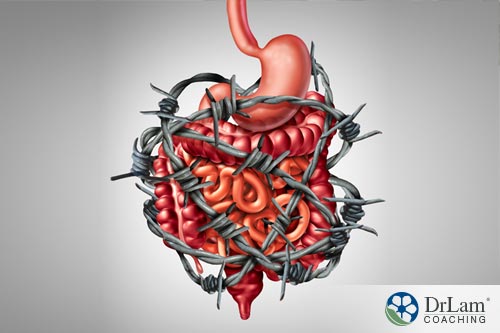 Irritable Bowel Syndrome (IBS) is a debilitating, uncomfortable, and sometimes embarrassing condition. Treatment for IBS can be as difficult as dealing with its symptoms, and some people experience constant fluctuations in their health because of it. This is particularly true for people who suffer from Adrenal Fatigue Syndrome (AFS), which often causes or is exacerbated by the symptoms and problems associated with IBS. Treatment for IBS may start with making several important lifestyle and other changes if you want to start enjoying your life again.
Irritable Bowel Syndrome (IBS) is a debilitating, uncomfortable, and sometimes embarrassing condition. Treatment for IBS can be as difficult as dealing with its symptoms, and some people experience constant fluctuations in their health because of it. This is particularly true for people who suffer from Adrenal Fatigue Syndrome (AFS), which often causes or is exacerbated by the symptoms and problems associated with IBS. Treatment for IBS may start with making several important lifestyle and other changes if you want to start enjoying your life again.
IBS affects the large intestine, and up to 10-15 percent of the population under the age of 50 may suffer from this condition. This is a problem because IBS can be stressful and debilitating. The embarrassing and uncomfortable symptoms associated with this disorder can cause weight loss, malnutrition, and dehydration as well as emotional and mental anguish.
IBS symptoms include:
IBS is a chronic condition and there is no cure or precise cause. However, there are a number of factors that may play key roles in its development. This includes inflammation, the balance of your gut bacteria, gut infections, an oversensitive immune system that overreacts to gut changes, and abnormally strong muscle contractions in the intestine.
Unfortunately, this condition isn’t well understood. So if you suffer from IBS, then you will need to learn how to manage it over time. Managing IBS usually depends on the severity of your symptoms, and there is a lot of variety. Some people experience severe symptoms that have to be managed through medication, while others have less severe symptoms that respond to lifestyle and dietary changes. Fortunately, this condition doesn’t seem to cause long-term damage to the tissues of the bowel or increase your risk of cancer.
No known test can definitely diagnose you with the condition. Rather, a diagnosis is made by considering your medical history, doing a physical exam, and conducting certain tests that determine whether other conditions may cause your symptoms. It is only once other possible health issues are ruled out that certain criteria are used to determine whether you have IBS. These include:
Based on your specific symptoms, IBS is generally divided into IBS with diarrhea, IBS with constipation, or mixed IBS, i.e. you could have alternating bouts of diarrhea and constipation
One of the most important keys to managing IBS is understanding your triggers. People with IBS usually experience fluctuating symptoms, which can be triggered by:
 When you’re stressed, you will probably experience worse or more frequent IBS symptoms. This connection isn’t fully understood, but it’s clear that although stress doesn’t cause the symptoms, it may exacerbate them. The mind-body connection is real, so whatever your mind is stressed about might cause the somatic IBS symptoms you experience.
When you’re stressed, you will probably experience worse or more frequent IBS symptoms. This connection isn’t fully understood, but it’s clear that although stress doesn’t cause the symptoms, it may exacerbate them. The mind-body connection is real, so whatever your mind is stressed about might cause the somatic IBS symptoms you experience.
Certain foods such as dairy products, fruits, wheat, cabbage, dairy, beans, and carbonated drinks can worsen or trigger IBS symptoms. The nature of the connection between these types of foods and IBS isn’t fully understood. The gut problems aren’t caused by true food allergies, which also affect the mouth, digestive tract, skin, and the respiratory tract. Instead, the reaction is limited to the gut, which means that in most cases it may be caused by a hypersensitivity to certain types of food rather than an allergy.
Women are twice as likely to have IBS, which suggests that hormones may play a key role in this disorder. Also, women with IBS often complain that their symptoms are worse during their period, which further confirms this connection.
IBS is very common in people who have AFS. AFS is caused by the overuse of the NeuroEndoMetabolic (NEM) Stress Response system, which makes changes in the body during times of stress. These changes protect your body from the effects of the stress and prepare you to respond, that is to fight or to flee. The NEM stress response is designed for short term activation, during a crisis. However, your body doesn’t know that, and so this stress response naturally activates whenever you’re under any type of stress.
Stress is one of the biggest problems in the modern world, and it comes from a variety of sources including your relationships, your work, your environment, and your lifestyle. In fact, for many people stress is a chronic and ongoing problem, which means that the NEM stress response is active for long periods, perhaps even constantly. This causes the adrenal glands to become fatigued.
The adrenals excrete the stress hormone cortisol, which keeps your body in a state of hyperawareness and heightened energy. This state is beneficial if you’re about to run from a predator, but when you’re in this state over the long term it can be dangerous. Ongoing stress creates a high and ongoing demand for cortisol, which can eventually lead to adrenal fatigue. Unfortunately, this is only the start of the story. When the adrenals become fatigued it can cause widespread circuit imbalances as well as problems in every part of the body.
 One of the key areas that’s affected by AFS is the gut and stomach. This can result in symptoms like constipation, diarrhea, and stomach upsets. And if you have IBS, the two disorders can act in concert to further reduce your quality of life, cause additional stress, and result in debilitating symptoms. All of these symptoms and issues will not only worsen your AFS by causing inflammation but may also hamper any changes you make designed for effective IBS treatment.
One of the key areas that’s affected by AFS is the gut and stomach. This can result in symptoms like constipation, diarrhea, and stomach upsets. And if you have IBS, the two disorders can act in concert to further reduce your quality of life, cause additional stress, and result in debilitating symptoms. All of these symptoms and issues will not only worsen your AFS by causing inflammation but may also hamper any changes you make designed for effective IBS treatment.
Your body is made up of a series of circuits in the NEM stress response system that work together to keep your body functioning and healthy. Unfortunately, AFS can throw off this natural balance, which results in ongoing problems. The inflammation circuit is one of the first to be affected with this disorder. It includes the microbiome or the bacterial balance in your body, the immune system, and the gut, and it activates when your body senses some type of damage or threat. When a pathogen, potentially dangerous substance, or injury is detected, this circuit initiates changes that result in swelling, pain, redness, and heat. Under normal circumstances, the inflammation helps the body rid itself of the threat, and then it dissipates once the threat is removed. However, this system can cause a variety of very serious problems when the cause of the inflammation is ongoing.
Ongoing, chronic inflammation is strongly connected to certain types of cancer, heart disease, and stroke, as well as to immune diseases such as lupus or arthritis. In fact, this may be one of the most dangerous conditions in the modern world as well as one of the hardest to fix. Some of the most common symptoms of chronic inflammation are food sensitivities, IBS, leaky gut, inflammatory bowel disease, and bacterial overgrowth in the small intestine. And when these types of symptoms occur, they will not only cause further inflammation, but they will also make the inflammation more unbalanced.
AFS causes widespread circuit imbalances. Each circuit in the body exists in a delicate balance, with the systems within each circuit working together as well as separately to perform their duties. However, as AFS progresses it can cause one or more of the systems in a circuit to become dysfunctional, which can unbalance the other systems. Some of the first symptoms associated with AFS have to do with the gut and digestion, which means that the inflammation circuit is often one of the first to be disrupted by this disorder. And this, in turn, can cause changes in the body’s microbiota, which will activate the immune system and cause even more inflammation. This is often a vicious and worsening circle for people with AFS, and it will cause widespread general problems as well as difficulty managing IBS and its symptoms.
If you have AFS, then you’ll probably struggle with managing IBS. Both AFS and IBS cause debilitating, embarrassing symptoms as well as ongoing physical and emotional stress. So this means that your IBS may worsen your AFS or even contribute to your stress levels, and your AFS may worsen or trigger your IBS. As these two disorders interact in this way, it will cause more inflammation and further imbalances in the inflammation circuit, which can put you at risk of other symptoms as well as a few very dangerous conditions. That’s why it’s so important that you find a way to manage your IBS if you have AFS.
 If you’re working on managing IBS, then there are a number of lifestyle changes that will help alleviate your symptoms. Making these changes will not only help you manage your IBS symptoms, but they will also reduce your body’s overall stress levels and the demand on your adrenal glands, which may eliminate or reduce some of your AFS symptoms. Also, by helping your digestive system return to a state of better health, you will reduce the amount of inflammation in your body and help rebalance the inflammation circuit, which will further improve your health.
If you’re working on managing IBS, then there are a number of lifestyle changes that will help alleviate your symptoms. Making these changes will not only help you manage your IBS symptoms, but they will also reduce your body’s overall stress levels and the demand on your adrenal glands, which may eliminate or reduce some of your AFS symptoms. Also, by helping your digestive system return to a state of better health, you will reduce the amount of inflammation in your body and help rebalance the inflammation circuit, which will further improve your health.
Some of the most important changes you need to make to this end are:
Make sure you space your meals at least four hours apart to allow for a complete migrating motor complex (MMC) sweep. This complex refers to the patterns of electromechanical activity in the gut between meals that moves residual foods through the digestive tract.
Don’t just shove food in your mouth without thinking about it or without completely chewing the previous mouthful. Make sure that you chew everything really well and eat slowly, to give your body time to adjust. Appreciate the taste of the food and chew at least 20 times for each mouthful for mindful eating.
Food intolerances and allergies often come along with IBS. You can usually work out which foods your body can’t tolerate through elimination diets or allergy testing. This can be a laborious process, but it’s also well worth the time if it means you will be healthier over the long term. If you have frequent diarrhea with your IBS, then you may want to try the FODMAP diet. This is a diet devised by Monash University that assumes IBS symptoms are triggered by undigested sugars in the gut. This eating plan is based on the idea of managing IBS by eliminating or drastically reducing foods that contain these sugars.
If you suffer from constipation with IBS, then try to increase your fiber intake. However, be careful when implementing this strategy as you don’t want to overload your gut or cause more stress. And if you notice ill effects after making this change, then discontinue immediately.
 This will help to regulate your bowels and reduce your overall stress levels. Adopting this strategy will not only help with IBS home treatment but may also lessen your AFS symptoms.
This will help to regulate your bowels and reduce your overall stress levels. Adopting this strategy will not only help with IBS home treatment but may also lessen your AFS symptoms.
Stress can trigger or worsen your IBS symptoms, which is why you need to adopt lifestyle strategies that decrease your overall stress levels. Some helpful practices include Cognitive Behavioral Therapy (CBT), yoga, or meditation.
Treating IBS isn’t always easy. If you have this disorder, then you’ll probably experience a period of adjustment during which you try various strategies to address your symptoms and get back your normal quality of life. There is no single solution to this condition at the moment, but it can be managed through some simple lifestyle changes that will improve your overall health and lower your stress levels. This is even more important if you suffer from AFS because it will allow your adrenal glands to rest and reduce their overall workload and be of great benefit in your AFS recovery and in your battle against IBS.
If suffering from IBS, do remember the following to help ease your symptoms:
If you would like to know more about Irritable Bowel Syndrome (IBS) or need some assistance in addressing the issue, the team at Dr. Lam Coaching can help. We offer a free** no-obligation phone consultation at +1-626-571-1234 where we will privately discuss your symptoms and what your options are. You can also send us a question through our Ask The Doctor system by clicking here.
Managing IBS can be extremely complicated, because not everyone will react the same way to the lifestyle changes that are necessary to address this uncomfortable disorder. The key is to find the combination of lifestyle and dietary changes that work for you and your body.
